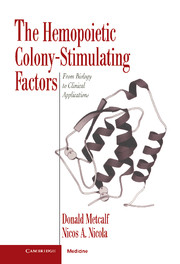Book contents
- Frontmatter
- Contents
- Preface
- 1 Historical introduction
- 2 General introduction to hemopoiesis
- 3 Key techniques in analyzing hemopoiesis
- 4 Biochemistry of the colony-stimulating factors
- 5 Biochemistry of the colony-stimulating factor receptors
- 6 Molecular genetics of the colony-stimulating factors and their receptors
- 7 Biological actions of the colony-stimulating factors in vitro
- 8 The biology of colony-stimulating factor production, degradation, and clearance
- 9 Actions of the colony-stimulating factors in vivo
- 10 Role of the colony-stimulating factors in basal hemopoiesis
- 11 Actions of the colony-stimulating factors in resistance to infections
- 12 Role of the colony-stimulating factors in other disease states
- 13 The colony-stimulating factors and myeloid leukemia
- 14 Clinical uses of the colony-stimulating factors
- 15 Conclusions
- References
- Index
7 - Biological actions of the colony-stimulating factors in vitro
Published online by Cambridge University Press: 04 August 2010
- Frontmatter
- Contents
- Preface
- 1 Historical introduction
- 2 General introduction to hemopoiesis
- 3 Key techniques in analyzing hemopoiesis
- 4 Biochemistry of the colony-stimulating factors
- 5 Biochemistry of the colony-stimulating factor receptors
- 6 Molecular genetics of the colony-stimulating factors and their receptors
- 7 Biological actions of the colony-stimulating factors in vitro
- 8 The biology of colony-stimulating factor production, degradation, and clearance
- 9 Actions of the colony-stimulating factors in vivo
- 10 Role of the colony-stimulating factors in basal hemopoiesis
- 11 Actions of the colony-stimulating factors in resistance to infections
- 12 Role of the colony-stimulating factors in other disease states
- 13 The colony-stimulating factors and myeloid leukemia
- 14 Clinical uses of the colony-stimulating factors
- 15 Conclusions
- References
- Index
Summary
Each of the colony-stimulating factors can stimulate the proliferation of granulocyte-macrophage progenitor cells and their progeny. This is most readily demonstrated as the formation by these progenitor cells of granulocytic and/or macrophage colonies in semisolid agar cultures. This was the original biological action noted for the CSFs and was used as the bioassay to monitor their purification. However, it is now recognized that each CSF can exert other actions on granulocyte-macrophage populations (Metcalf, 1991a). These include (a) differentiation commitment, (b) maturation induction, (c) maintenance of membrane transport and cell viability, and (d) stimulation of mature cell functional activity.
Each of these major functions will be discussed separately. Because no functional differences have been noted in vitro between native or recombinant CSFs, either glycosylated or nonglycosylated, the type of molecule used in particular studies will not necessarily be identified.
Proliferative stimulation
When single CSFs are used as the stimulus for granulocyte-macrophage colony formation, cell separation studies have shown that the cells generating the colonies are committed granulocyte-macrophage progenitor cells (Nicola et al., 1980; Metcalf, 1984). Analysis using the glucoses-phosphate dehydrogenase marker (Singer et al., 1979) and the use of single cell cultures have shown that colonies are the clonal progeny of individual progenitor cells. If care is taken to avoid significant colony overcrowding in agar cultures (fewer than 50 colonies per 1 ml culture), then the cells within any one colony can be safely accepted as being the clonal progeny of that progenitor cell. This generalization is subject to certain qualifications: (a)Methylcellulose cultures allow significant cell and clonal movement and are less reliable than the more solid agar cultures in ensuring that clones remain distinct.
- Type
- Chapter
- Information
- The Hemopoietic Colony-stimulating FactorsFrom Biology to Clinical Applications, pp. 109 - 165Publisher: Cambridge University PressPrint publication year: 1995
- 3
- Cited by



